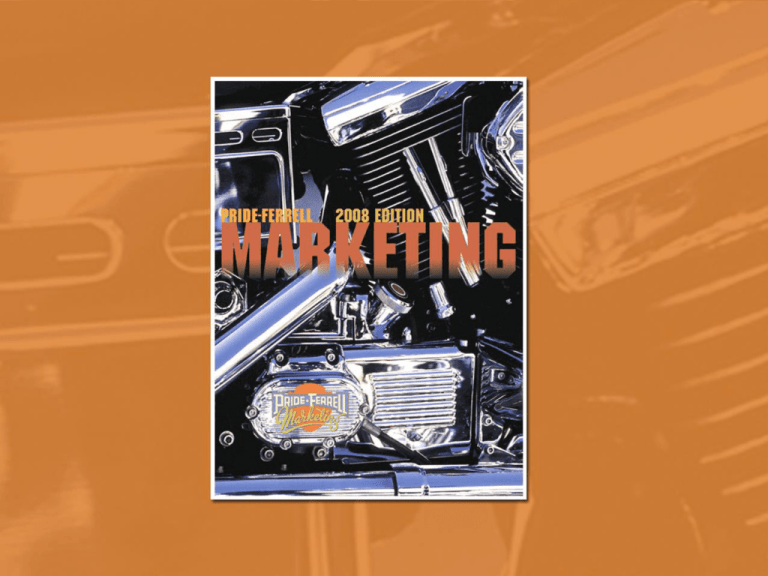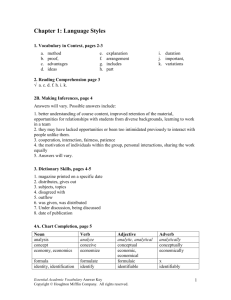
Part Two
Environmental Forces, Social
Responsibility, And Ethics
3. The Marketing Environment
4. Social Responsibility And Ethics In Marketing
Copyright © Houghton Mifflin Company. All rights reserved.
3|2
Chapter 3
The Marketing
Environment
Objectives
• Recognize importance of environmental scanning and
analysis
• Understand how competitive/economic factors affect
organizations’ ability to compete and customers’
ability/willingness to buy products
• Identify political forces in marketing environment
• Understand how laws, government regulations, and selfregulatory agencies affect marketing
• Explore effects of new technology on society and on marketing
• Analyze sociocultural issues marketers must deal with as they
make decisions.
Copyright © Houghton Mifflin Company. All rights reserved.
3|4
Environmental Scanning
The process of collecting information about
the forces in the marketing environment.
Copyright © Houghton Mifflin Company. All rights reserved.
3|5
Scanning Involves:
• Observation
• Secondary Sources
–
–
–
–
–
Business
Trade
Government
General-interest publications
Marketing research
• Cautions
– Know how to use information
– Don’t gather too much information
Copyright © Houghton Mifflin Company. All rights reserved.
3|6
Environmental Analysis
The process of assessing and interpreting
the information gathered through
environmental scanning.
Copyright © Houghton Mifflin Company. All rights reserved.
3|7
Responding To
Environmental Forces
• Accept as uncontrollable- passive
and reactive
• Attempt to influence and shape
them-proactive
– Constructive
– Bring desired results
– Are limits
Copyright © Houghton Mifflin Company. All rights reserved.
3|8
Competition
Other organizations that market products
that are similar to or can be substituted
for a marketer’s products in the same
geographic area.
Copyright © Houghton Mifflin Company. All rights reserved.
3|9
Types Of Competitors
• Brand- products with similar features and
benefits for same customers at similar prices
• Product- same product class but products
with different features, benefits, and prices
• Generic- different products that solve same
problem or satisfy same basic customer need
• Total Budget- compete for limited financial
resources of same customers
Copyright © Houghton Mifflin Company. All rights reserved.
3 | 10
Monopoly
A competitive structure in which an
organization offers a product that has no
close substitutes, making that organization
the sole source of supply.
Royal Mail Monopoly
Copyright © Houghton Mifflin Company. All rights reserved.
3 | 11
Oligopoly
A competitive structure in which a few
sellers control the supply of a large
proportion of a product.
Copyright © Houghton Mifflin Company. All rights reserved.
3 | 12
Monopolistic Competition
A competitive structure in which a firm has
many potential competitors and tries to
develop a marketing strategy to differentiate
its product.
Copyright © Houghton Mifflin Company. All rights reserved.
3 | 13
Pure Competition
A market structure characterized by an
extremely large number of sellers, none
strong enough to significantly influence
price or supply.
Copyright © Houghton Mifflin Company. All rights reserved.
3 | 14
Types Of
Competitive Structures
Copyright © Houghton Mifflin Company. All rights reserved.
3 | 15
Monitoring Competition
• Price- most competitors monitor
• Do more than analyze information
• Develop ongoing system for gathering
information
• Understand market - customer needs
• Helps in recognition of own strategy flaws
Copyright © Houghton Mifflin Company. All rights reserved.
3 | 16
Economic Forces
• Economic Conditions
• Buying Power
• Willingness to Spend
Copyright © Houghton Mifflin Company. All rights reserved.
3 | 17
Business Cycle
A pattern of economic fluctuations that
has four stages: prosperity, recession,
depression, and recovery.
Copyright © Houghton Mifflin Company. All rights reserved.
3 | 18
Economic Conditions
• Prosperity- low unemployment, high total income,
ensure buying power
• Recession- unemployment rises, total buying power
declines, stifling consumer/business spending
• Depression- unemployment high, wages are low, total
disposable income at a minimum, consumers lack
confidence in the economy
• Recovery- economy moves from
recession/depression to prosperity
Copyright © Houghton Mifflin Company. All rights reserved.
3 | 19
Buying Power
Resources, such as money, goods, and
services that can be traded in an exchange.
Copyright © Houghton Mifflin Company. All rights reserved.
3 | 20
Income
For an individual, the amount of money
received through wages, rents, investments,
pensions, and subsidy payments for a given
period.
Copyright © Houghton Mifflin Company. All rights reserved.
3 | 21
Types Of Income
• Disposable - after-tax
• Discretionary - disposable income available for
spending and saving after an individual has
purchased the basic necessities of food,
clothing, and shelter
Copyright © Houghton Mifflin Company. All rights reserved.
3 | 22
Wealth
The accumulation of past income, natural
resources, and financial resources.
As people’s wealth increases:
1. Make current purchases
2. Generate income
3. Acquire large amounts of credit
Copyright © Houghton Mifflin Company. All rights reserved.
3 | 23
Willingness To Spend
An inclination to buy because of expected
satisfaction from a product, influenced by
the ability to buy and numerous
psychological and social forces.
Copyright © Houghton Mifflin Company. All rights reserved.
3 | 24
Political Forces
• Legislation enacted
• Legal decisions interpreted by courts
• Regulatory agencies created and operated
• Marketers
– Adjust to conditions
– Influence through contributions
Copyright © Houghton Mifflin Company. All rights reserved.
3 | 25
Top Corporate Donors
By Political Party
Copyright © Houghton Mifflin Company. All rights reserved.
3 | 26
Legal And
Regulatory Forces
• Procompetitive legislation- preserves competition
• Consumer Protection legislation
– Protect people from harm
– Prohibit hazardous products
– Information disclosure
– Particular marketing activities
• Encourage compliance
• Regulatory Agencies
• Self-Regulatory forces
Copyright © Houghton Mifflin Company. All rights reserved.
3 | 27
Major Laws
Affecting
Marketing
Decisions
Copyright © Houghton Mifflin Company. All rights reserved.
3 | 28
Federal Trade Commission
An agency that regulates a variety of
business practices and curbs false
advertising, misleading pricing, and
deceptive packaging and labeling.
Copyright © Houghton Mifflin Company. All rights reserved.
3 | 29
Federal Trade
Commission Enforcement Tools
Source: www.ftc.gov.
Federal Trade Commission Website
Copyright © Houghton Mifflin Company. All rights reserved.
3 | 30
Major Federal
Regulatory Agencies
Copyright © Houghton Mifflin Company. All rights reserved.
3 | 31
Direct-To-Consumer
Pharmaceutical Guidelines
Copyright © Houghton Mifflin Company. All rights reserved.
3 | 32
Self-Regulatory Forces
•
•
•
•
Trade Associations
Better Business Bureau
National Advertising Review Board
Advantages
– Less expensive
– More realistic
• Limitations
– Nonmember firms do not have to abide
– Lack of enforcement tools
– Often less strict
Copyright © Houghton Mifflin Company. All rights reserved.
3 | 33
Technology
The application of knowledge and tools
to solve problems and perform tasks
more efficiently.
Copyright © Houghton Mifflin Company. All rights reserved.
3 | 34
Effects Of Technology
• Dynamics- constant change
• Reach- moves throughout society
• Self-sustaining- catalyst to spur faster
development
Copyright © Houghton Mifflin Company. All rights reserved.
3 | 35
Sociocultural Forces
The influences in a society and its culture(s)
that change people’s attitudes, beliefs,
norms, customs, and lifestyles.
Copyright © Houghton Mifflin Company. All rights reserved.
3 | 36
Issues Of Sociocultural Forces
• Demographic and diversity characteristics
– Age, gender, race, ethnicity
– Marital/parental status, income, education
• Cultural values
– Health
– Family
– Environment
• Consumerism- efforts to protect consumers’ rights
Copyright © Houghton Mifflin Company. All rights reserved.
3 | 37
U.S. Population
Projections By Race
Source: U.S. Bureau of the Census, Statistical Abstract of the United States, 2000; Reed Business Info, July 11, 2005.
Copyright © Houghton Mifflin Company. All rights reserved.
3 | 38


